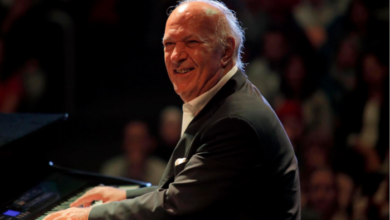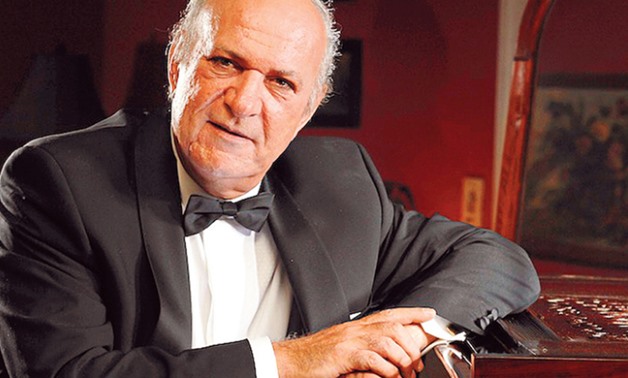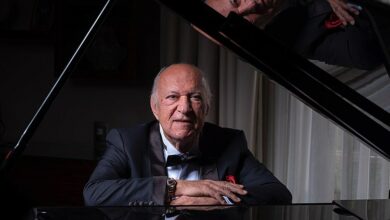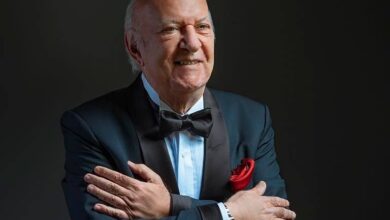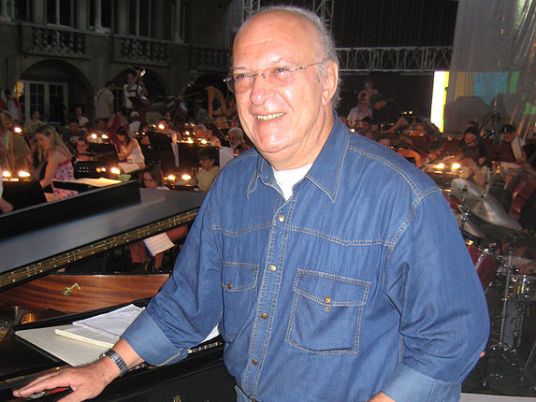
Last August, the floor of a theater in Ismailia opened to allow Omar Khairat to rise through the floorboards with his piano, the instrument that has accompanied him for 40 years. He was the star at the opening ceremony of the new Suez Canal.
That night, Khairat caressed the keys of the piano as if he were alone, instead of in front of millions.
In his Garden City office, a haven that displays an Arab influence and smells of incense, Al-Masry Al-Youm interviewed Khairat for a full hour.
Q: How were you chosen for the opening ceremony of the new Suez Canal?
A: I had expressed my wish in a television interview to take part in it. And my wish came true.
Q: How did you prepare yourself for it?
A: I chose pieces of my composition that I thought would suit the event, bearing in mind that there are foreigners among the audience. Then we held rehearsals on location for four days before the opening. It was a great honor for me.
Q: How would you evaluate the current regime, considering the new Suez Canal is not the only project it has worked on?
A: I am proud, happy and optimistic regarding the concrete steps that our savior, President Abdel Fattah al-Sisi, is taking.
Q: You call him savior?
A: Of course. He saved Egypt from a dark abyss.
Q: But are we not still facing problems? What about terrorism?
A: There is a global plot to divide Egypt like Syria, Iraq, Yemen and Libya have been. But Egypt is fighting and curbing it. And it will disappear very soon because the people support their president.
Q: Does music play a role in this?
A: Of course. Music makes people feel good. I was keen on giving many concerts when the Muslim Brotherhood was ruling so as to fight the grim atmosphere this group had created.
Q: Have you thought of running in the Musicians' Syndicate elections?
A: No, I just like to compose music.
Q: What advice would you give to Hany Shaker, the new chairman of the syndicate?
A: I am sure he knows what to do because he is a good artist, but I would ask him to take care of the retired musicians so they may live in a comfortable and healthy way.
Q: How can we improve the Opera company?
A: We need to improve the salaries of the orchestra and all other workers, and the location and equipment need to be well-maintained, for musicians are soldiers who raise the level of culture and alleviate the suffering of the people.
Q: What do you make of the so-called “underground” bands?
A: I do not understand their music. I think they imitate the West. They have no Egyptian character. I only know the music that carries meaning and addresses the heart.
Q: Why is that, when you yourself were once a drummer for “Les Petits Chats,” a band that played Western music?
A: It was forbidden for a student of classical music to play the drums or play jazz. It was a kind of revolt on my part, but I learned a lot at that time. It was from 1967 to 1971. After that, I went back to the piano and the Conservatoire.
Q: How were you influenced by your uncle, the great musician Abu Bakr Khairat?
A: He made classical symphonies and concertos, whereas I was influenced by different types of music.
Q: How were you influenced by your mother?
A: She was the reason for my success. I am glad she saw my success before she died.
Q: Why aren’t there other composers like you in Egypt?
A: This type of music needs special talent and a long academic study.
Q: You did two ballets. How different were they?
A: Ballet is a very special art where music is the hero and the engine that moves the dancers.
Q: Which librettist and singer do you feel best express your music?
A: Abnoudy, Ayman Bahgat Amar and Gamal Bekheit are good librettists. And Ali al-Haggar is the singer for whom I mostly wrote. But I also like Amal Maher’s voice.
Q: Do you listen to your own music?
A: No. It is all in my mind anyway.
Q: You made eight albums. Are there more to come?
A: I am working on a single piece. Producers do not like albums because they are often pirated. I also have many compositions that have not been produced yet.
Q: How about a film score?
A: It will have to be a good piece of work by a good director who finishes it on time. Directors are often late, which stalls other projects of mine.
Q: Did Youssef Chahine really cry when he listened to your music?
A: Yes, when he listened to my song “Al-Masry.”
Q: What about Abdel Wahab?
A: He once called me and said: 'I congratulate you. May God preserve you for the sake of Egypt.' But the best praise I get is from my audience.
Edited translation from Al-Masry Al-Youm

